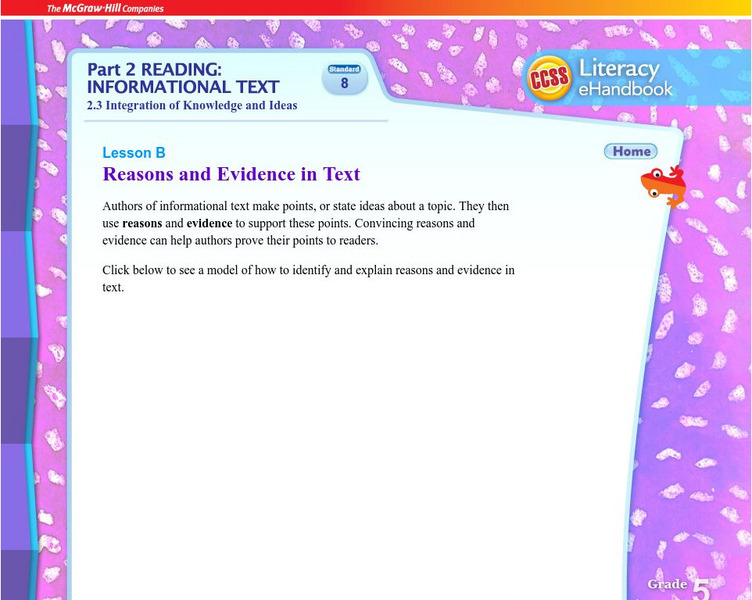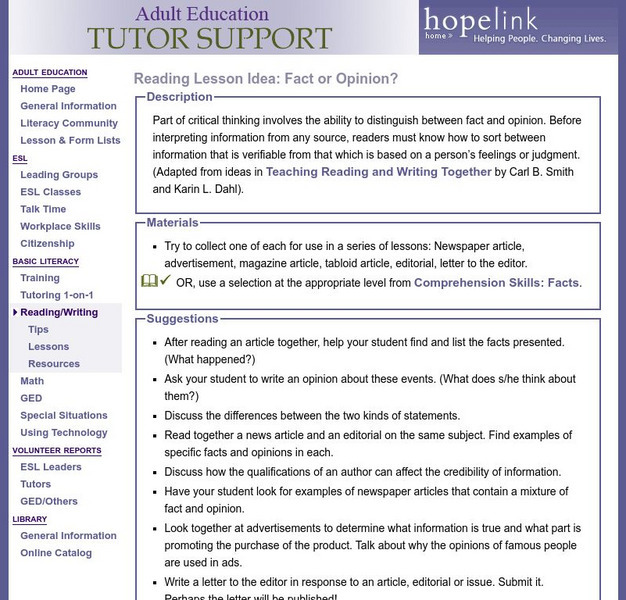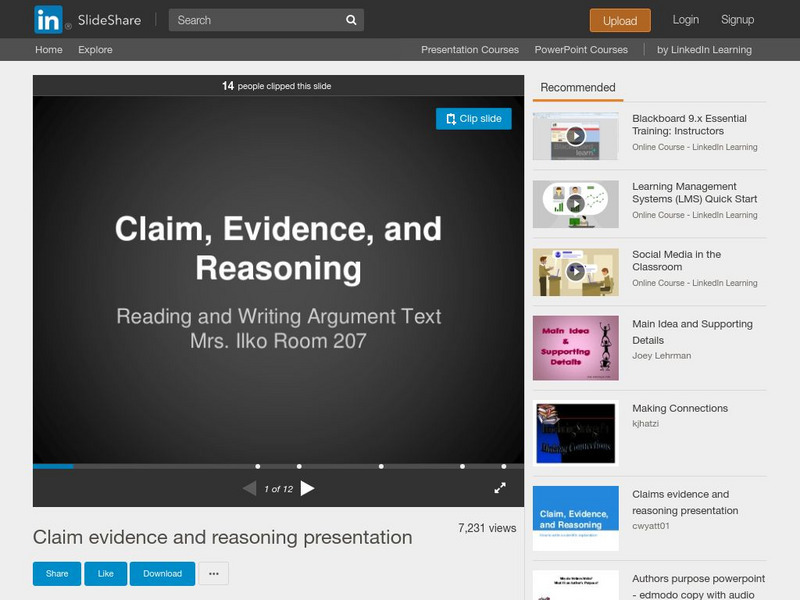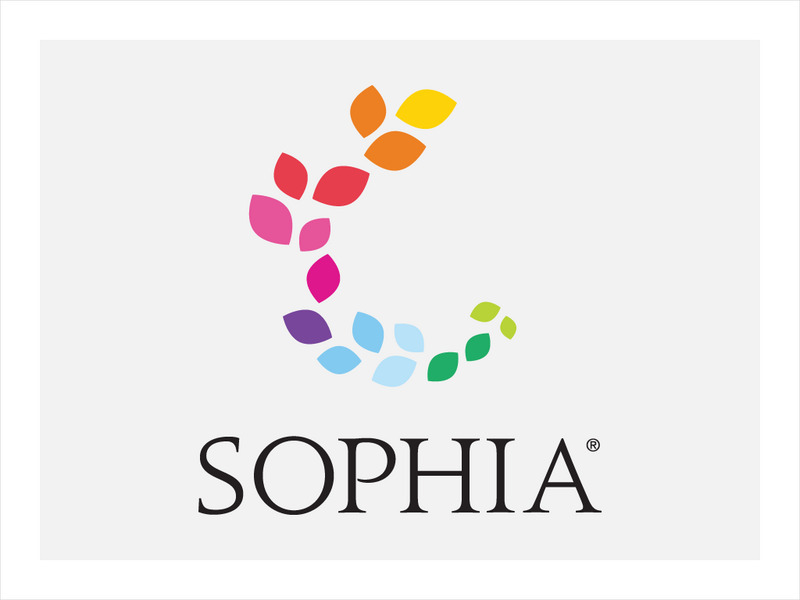Curated OER
Mc Graw Hill: Part 2 Reading: Informational Text: Evaluate Arguments and Claims
This article will help you evaluate informational text to determine whether an author's argument is supported by evidence or not. Click on Model to see a model with explanations and then click on Practice.
Polk Brothers Foundation Center for Urban Education at DePaul University
De Paul University: Center for Urban Education: I Can Identify and Infer Character Traits[pdf]
Students will identify character traits directly and inferentially with the help of this graphic organizer. Students will summarize their findings after completing the graphic organizer.
Polk Brothers Foundation Center for Urban Education at DePaul University
De Paul University: Center for Urban Education: I Can Infer Character Traits and Support [Pdf]
Students can use this graphic organizer while making inferences about characters in a story or history text. Students will collect text evidence in the chart to support their character trait inferences.
Education Development Center
Tv411: Summarizing
This activity asks students to read short paragraphs and select the statement that best summarizes each paragraph. It is part of a larger reading unit.
Polk Brothers Foundation Center for Urban Education at DePaul University
De Paul University: Center for Urban Education: I Can Identify and Infer Character Traits[pdf]
A poster offers guiding questions to help students with identifying character traits. Guiding questions are also provided to help them support their inferences about the character traits.
ReadWriteThink
Read Write Think: Research Building Blocks: Skim, Scan, and Scroll
Contains plans for two lessons on locating supporting details that are part of a larger unit on researching a state symbol. It works on skills like determining the most important information, using key words to identify relevant...
ReadWriteThink
Read Write Think: Guided Comprehension: Evaluating
This lesson introduces students to the comprehension strategy of evaluating. Students learn this strategy through the "meeting of the minds" technique that teaches them to act out opposing views of two or more characters.
Annenberg Foundation
Annenberg Learner: Journey North: Reading Strategies: Identify Author's Viewpoint
This reading resource discusses the strategy of identifying an author's viewpoint. A list of guiding questions is provided to help students as they analyze the author's viewpoint.
Grammarly
Grammarly Handbook: Evidence
This page focuses on the evidence to support points in an essay. Be sure you have enough support for each point and that the points are strong ones. It also suggests you double check both direct and indirect quotations in your paper to...
Polk Brothers Foundation Center for Urban Education at DePaul University
De Paul University: Center for Urban Education: Identify/infer Character Traits [Pdf]
This page contains links for three graphic organizers. Students will use graphic organizers to identify character traits, infer character traits, and support inferences with text evidence.
Curated OER
Mc Graw Hill: Part 2 Reading: Informational Text: Reasons and Evidence in Text
Reasons and evidence are given by the author to support topics or ideas. In this resource, learn about finding reasons and evidence in a text. Includes downloadable worksheet.
ReadWriteThink
Read Write Think: Guided Comprehension: Self Questioning
Online lesson introduces students to the concept of self-questioning, assisting them in an understanding of question-answer relationships that should improve their reading comprehension skills. In-depth study will lead to improved...
Hopelink
Hopelink: Reading Lesson Idea: Fact or Opinion?
In this instructional activity, students must learn to recognize the differences between fact and opinion.
Polk Brothers Foundation Center for Urban Education at DePaul University
Depaul University: Center for Urban Education: Evaluate Support for a Claim[pdf]
This resource provides a downloadable worksheet to use after reading a nonfiction text. Students will evaluate an author's support for a claim by answering the questions and prompts provided on the worksheet.
E Reading Worksheets
E Reading Worksheets: Fact and Opinion Lessons
In this learning module, students will learn more about the differences between facts and opinions. A PowerPoint presentation and related activity are provided to reinforce the topic of facts vs. opinions. This module is designed to...
Tom Richey
Slide Share: Claim Evidence and Reasoning
A slideshow with twelve slides about reading or writing an argument, analyzing the claim and looking at how it is supported with observation, evidence, and reasoning.
Read Works
Read Works: The Roots of Southern Food
[Free Registration/Login Required] An informational text about Southern food and how it has evolved throughout time. A question sheet is available to help students build skills in reading comprehension.
E Reading Worksheets
E Reading Worksheets: Fact and Opinion: Reading Test 3
A 25-question quiz where students must identify statements as fact or opinion. Results can be printed, saved, or emailed.
Read Works
Read Works: Fourth Grade: One Lesson Unit: Drawing Conclusions
[Free Registration/Login Required] Learners are guided through a lesson to understand the difference between explicit information and conclusions drawn from a text. With free login, users have access to passages used in this lesson.
Sophia Learning
Sophia: Elements of an Effective Argument
Discussion focuses on understanding the three academic language objectives that make an effective argument: understand the concept of a thesis statement, the significance of writing an argument with an audience in mind, and the...
Polk Brothers Foundation Center for Urban Education at DePaul University
De Paul University: Center for Urban Education: Evaluate the Strength of Evidence [Pdf]
This resource provides a downloadable worksheet that will assist students after they read a piece of nonfiction. Students will answer guided questions to help them determine the strength of evidence used when supporting a claim....
Curated OER
Mc Graw Hill: Part 2 Reading: Informational Text: Reasons and Evidence in Text
An article discussing how authors use reasons and evidence to support their ideas in a text. Site includes an example to help students find reasons and evidence.
Sophia Learning
Sophia: Supporting Details Explained
This slideshow focuses on supporting details; it discusses their purpose, the audience, and the point to be made. It lists the five most common types of supporting details: facts, statistics, opinions, examples, and personal observations...
Curated OER
Mc Graw Hill: 6th Grade Use Text Evidence
Learn how to use text evidence to draw inferences; click the Model button on bottom right.



![De Paul University: Center for Urban Education: I Can Identify and Infer Character Traits[pdf] Graphic De Paul University: Center for Urban Education: I Can Identify and Infer Character Traits[pdf] Graphic](https://d15y2dacu3jp90.cloudfront.net/images/attachment_defaults/resource/large/FPO-knovation.png)





![De Paul University: Center for Urban Education: Identify/infer Character Traits [Pdf] Graphic De Paul University: Center for Urban Education: Identify/infer Character Traits [Pdf] Graphic](https://content.lessonplanet.com/knovation/original/119983-62ee3880b7ac71dbc7bc636a19f336da.jpg?1661787060)








